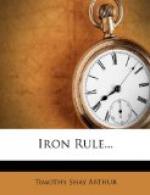“It is bad if your father forbids your doing so,” replied Mrs. Howland.
“No—it can’t be bad to play with Emily,” said the little fellow, speaking half to himself. “She’s so good, and I love her.”
All in vain proved the mother’s effort to make her boy see that it was wrong to play with Emily. He wanted a reason beyond the (sic) commannd of his father, and that she was not able to give. The more she talked with him, the more plainly did she see that rebellion was in his young heart, and that he would act it out in the face of all consequences. Deeply saddened was she at this conviction, for she well knew that obedience to parents is the good ground into which the seeds of civil and religious obedience in manhood must be sown.
As for herself, Mrs. Howland had no objection to little Emily Winters as the companion of Andrew. She was, as the boy said, a good girl, and her influence over him was for good. But the stern prejudice of Mr. Howland had come in to break up the friendship formed between the children, and his inflexible will would brook no opposition. All must bend to him, even at the risk of breaking.
Nearly half an hour did Mrs. Howland pass alone with her boy, striving to awaken the better impulses of his heart, and as they became active, seeking to implant in his mind a willingness to deny himself, in order to obey his father. But the father asked too much. There was no charge of evil against Emily as a reason for this interdiction. All the mother could say, was—
“It is your father’s wish and command, my child, and you must obey him.”
But this could not satisfy the boy’s mind in a case where his feelings were so deeply interested. At length, Mrs. Howland turned to leave the room. Andrew followed her to the door, and looking up with a sad light in his large eyes, murmured—
“I do love you, mother!”
A tear fell upon his face as his mother stooped to kiss him. A little while after, and he was alone.
“I’m afraid,” said Mrs. Howland, joining her husband soon after, “that we have done wrong in prohibiting all intercourse between Andrew and little Emily Winters.”
“Why so?” was quickly asked, and in no very pleasant tone of voice.
“The children are very much attached to each other.”
“That is no reason.”
“It would be no reason if there was anything bad about Emily. But there is not. She is a very good little girl.”
“I’m not so sure of that,” said Mr. Howland.
“I never saw anything out of the way in her.”
“It’s more than I can say of her father, then,” was replied. “There lies my chief objection. I want no intercourse between the families, and do not mean to have any. In this I am entirely in earnest. Andrew must seek another playfellow.”
“I’m afraid we will have a great deal of trouble,” sighed Mrs. Howland.
“I am not, then. Let me know whenever he disobeys in this matter, and I’ll apply the remedy in a way to cure him. His will has to be broken, and the present occasion is as good as any other for effecting so all-important an object. The stronger he is tempted to disobey, the more effectual will be the subjugation of his will, when the conquest is made.”




